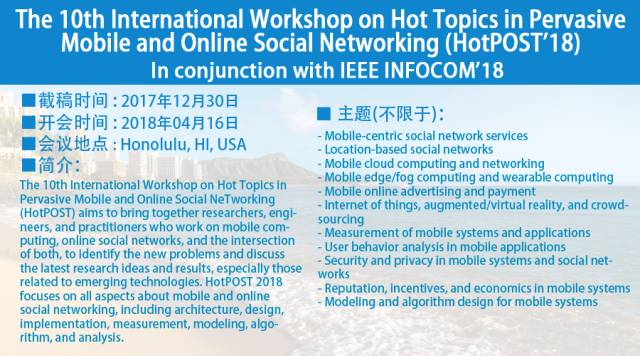计算机类 | 国际会议信息8条
图形学与多媒体
EuroCG 2018
European Workshop on Computational Geometry
全文截稿: 2018-01-09
开会时间: 2018-03-21
会议难度: ★★★
CCF分类: 无
会议地点: Berlin, Germany
网址:https://conference.imp.fu-berlin.de/eurocg18/home
The 34th European Workshop on Computational Geometry (EuroCG 2018) will be held on March 21-23, 2018 at the Department of Computer Science at Freie Universität Berlin, with a welcome reception on March 20 to launch the conference. EuroCG is an annual workshop that combines a strong scientific tradition with a friendly and informal atmosphere. The workshop is a forum where established researchers and students can meet, discuss their work, present their results, and establish scientific collaborations.
Topics of interest cover all aspects of computational geometry, including but not limited to the following:
-discrete and combinatorial geometry and topology
-design and analysis of geometric algorithms and data structures
-implementation and experimental evaluation of geometric algorithms
-numerical and algebraic issues arising from implementations
-analysis of geometric configurations
-geometric modeling, visualization and simulation
-combinatorial optimization
-graph drawing
-computer-aided design and manufacturing
-structural molecular biology
-geographic information systems
-robotics and virtual worlds
信息安全及密码学
DFRWS-USA 2018
Digital Forensic Research Workshop
全文截稿: 2018-01-12
开会时间: 2018-07-15
会议难度: ★★★
CCF分类: C类
会议地点: Providence, USA
网址:http://www.dfrws.org/conferences/dfrws-usa-2018
The DFRWS digital forensics conference brings together leading researchers, developers, practitioners, and educators from around the world to advance the state of the art in digital forensics. Established in 2001, DFRWS has become the premier digital forensics conference.
We invite original contributions in the form of research papers, non-research presentations, demos, and posters in the following topic areas:
-Memory analysis and snapshot acquisition
-Storage forensics, including solid state
-"Big data" forensics, related to collection, analysis, and visualization
-Incident response and live analysis
-Forensics of cloud and virtualized environments
-Malware and targeted attacks (analysis and attribution)
-Network and distributed system forensics
-Event reconstruction methods and tools
-Mobile and embedded device forensics
-Digital evidence storage and preservation
-Data recovery and reconstruction
-Multimedia analysis
-Database forensics
-Tool testing and development
-Digital evidence and the law
-Case studies and trend reports
-Data hiding and discovery
-Anti-forensics and anti-anti-forensics
-Interpersonal communications and social network analysis
-Non-traditional forensic scenarios and approaches (e.g. vehicles, Internet of Things, industrial control systems, and SCADA)
信息安全及密码学
TA-COS 2018
Workshop on Text Analytics for Cybersecurity and Online Safety
全文截稿: 2018-01-12
开会时间: 2018-05-12
会议难度: ★★
CCF分类: 无
会议地点: Miyazaki, Japan
网址:http://ta-cos.org
Fostering debate on technological advances and privacy concerns in the context of deploying text analytics for online safety purposes
The TA-COS workshop aims to bring together researchers that have an active interest in the development and application of text analytics systems in the broad context of cybersecurity. We welcome research papers on text analytics and text mining approaches that (1) help reduce the exposure to harmful content on the Internet, (2) detect illegal online activities and (3) monitor user-generated content in the context of real-life security threats. We are confident this workshop will allow for fruitful discussions on technological advances, privacy issues, data acquisition methods and other common goals and challenges that researchers face when deploying language technology tools for cybersecurity applications. Please visit http://ta-cos.org
for more details on the first run of the workshop, including the proceedings of the workshop.
We invite papers on a wide range of topics, including, but not limited to:
-text analytics tools for cybersecurity applications
-annotated corpora for the development and validation of cybersecurity applications
-text-based detection of cyberbullying behavior on social network sites
-systems for the early detection of threats to emotional well-being, such as announcements of potential suicide and auto-mutilation, pro-suicide sites, ...
-moderator tools for the detection of offensive user-generated content (e.g. racism, sexual content, profanity, ...)
-text analytics tools for the detection of illegal activities (e.g. terrorism threats, drug trade, ...)
-text analytics tools for the detection of sexually transgressive behavior (e.g. stalking, grooming, ...)
-intervention systems for the detection of radicalization and criminalization of teenagers
-author profiling tools for the detection of identity fraud, "catfishing", …
-position papers on fair and responsible use of text-based cybersecurity technologies (privacy concerns, ...)
人工智能
OSACT 2018
Workshop on Open-Source Arabic Corpora and Processing Tools
全文截稿: 2018-01-15
开会时间: 2018-05-08
会议难度: ★★
CCF分类: 无
会议地点: Miyazaki, Japan
网址:http://edinburghnlp.inf.ed.ac.uk/workshops/OSACT3/
Given the success of the first and second workshops on Open-Source Arabic Corpora and Corpora Processing Tools (OSACT) in LREC 2014 and LREC 2016, the third workshop comes to encourage researchers and practitioners of Arabic language technologies, including computational linguistics (CL), natural language processing (NLP), and information retrieval (IR), to share and discuss their research efforts, corpora, and tools. The workshop will also give special attention on the wide variety of initiatives for the creation, use, and evaluation of Arabic as a type of Asian Language Resources and Technologies, which is one of LREC 2018 hot topics. In addition to the general topics of CL, NLP and IR, the workshop will give a special emphasis on a new Arabic Data challenge track.
This year, we are introducing ArabicWeb16, a new Web dataset that is suitable for many research projects. ArabicWeb16 is a public Web crawl of 150M Arabic Web pages, crawled over the month of January 2016, with high coverage of dialectal Arabic (about 21%) as well as Modern Standard Arabic (MSA). One goal of the workshop is to define shared challenges using this dataset. We encourage submissions describing experiments for research tasks on the dataset. This includes (but not limited to) training word-embeddings, deduplication, cross-dialect search, question answering, dialect detection, knowledge-base population, entity search, blog search, text classification, and spam detection.
人工智能
HBPCURWSCS 2018
Cognitive systems for non-specialists
全文截稿: 2018-01-17
开会时间: 2018-03-13
会议难度: ★★
CCF分类: 无
会议地点: Munich, Germany
网址:https://education.humanbrainproject.eu/web/cognitive-systems-workshop
Cognitive systems are devices that are designed to mimic cognitive skills of higher developed biological organisms at varying levels of complexity and performance. Models of these skills can either be abstract functional descriptions from the vast field of cognitive science or detailed simulations of brain circuits from neuroscience. Novel hardware designs and the steadily increasing availability of cheap computing resources have recently yielded remarkable results especially with the latter models.
The goal of this workshop is to provide a definitive introduction to the theory of cognitive systems. Drawing from advances in brain research, the topic is approached from a computational-neuroscientific perspective rather than an abstract-psychological one, bridging the gap between the physical structure of the brain and the logical organization of its cognitive capabilities. Special focus is put on the role of robotics as a means to ground cognitive function in bodies that physically interact within different types of environments.
The workshop is open to the whole student community and early post-docs upon application. Applications from young female investigators are highly encouraged.
Application is required as space may be limited. Applicants selected for participation will be informed within two weeks after the application deadline.
There is no registration fee. Seven travel grants will be available upon request (European students only - residence). Accommodation can be provided for 30 students (first come, first served).
计算机综合与前沿
BIAS 2018
Bias in Information, Algorithms, and Systems
摘要截稿: 2018-01-10
全文截稿: 2018-01-20
开会时间: 2018-03-25
会议难度: ★★
CCF分类: 无
会议地点: Sheffield, UK
网址:http://ir.shef.ac.uk/bias
A half-day workshop at the 2018 iConference to be held in Sheffield, UK on Sunday, March 25, 2018
More than ever before, information, algorithms and systems have the potential to influence and shape our experiences and views. With increased access to digital media and the ubiquity of data and data-driven processes in all areas of life, an awareness and understanding of areas, such as algorithmic accountability, transparency, governance and bias, are becoming increasingly important. Recent cases in the news and media have highlighted the wider societal effects of data and algorithms requiring we pay it more attention.
The BIAS workshop will bring together researchers from different disciplines who are interested in analysing and tackling bias within their discipline, arising from the data, algorithms and methods they use. The theme of the workshop, bias in information, algorithms, and systems, includes, but is not limited to, the following areas:
-Bias in sources of data and information (e.g., datasets, data production, publications, visualisations, annotations, knowledge bases)
-Bias in categorisation and representation schemes (e.g., vocabularies, standards, etc.)
-Bias in algorithms (e.g., information retrieval, recommendation, classification, etc.)
-Bias in the broader context of information and social systems (e.g., social media, search engines, social networks, crowdsourcing, etc.)
-Considerations in evaluation (e.g., to identify and avoid bias, to create unbiased test and training collections, crowdsourcing, etc.)
-Interactions between individuals, technologies and data/information
-Considerations for data governance and policy
The workshop aims to identify potential avenues for future directions around the notions of bias, algorithmic transparency and accountability, with the concrete goal of generating a collaborative proposal for publishing a position paper (e.g., in ACM SIGIR Forum) and/or the coordination of a special issue on BIAS for the journal Online Information Review. With these goals in mind, the workshop will feature a keynote talk, presentations and posters from workshop participants, and thematic discussions in small groups.
软件工程
Ada-Europe 2018
International Conference on Reliable Software Technologies
全文截稿: 2018-01-22
开会时间: 2018-06-18
会议难度: ★★★
CCF分类: 无
会议地点: Lisbon, Portugal
网址:ae2018.di.fc.ul.pt/index.html
The conference has over the years become a leading international forum for providers, practitioners and researchers in reliable software technologies. The conference presentations will illustrate current work in the theory and practice of the design, development and maintenance of long-lived, high-quality software systems for a challenging variety of application domains. The program will allow ample time for keynotes, Q&A sessions and discussions, and social events. Participants include practitioners and researchers representing industry, academia and government organizations active in the promotion and development of reliable software technologies. The Ada language, a reliable software technology by design, crosses all topics of the conference, which nonetheless also welcomes any other technologies proposed or in use for reliable software.
This edition of Ada-Europe features a focused Special Session on Security in Safety-Critical Systems. Safety-critical systems, on which we daily bet our lives, have become increasingly more complex, networked and distributed. In combination with the growing professionalism of adversarial teams, this demands not only for safe systems but systems that remain safe while under attacks. This session seeks (but is not limited to) contributions aiming at bridging the safety and security gap in cyber-physical and other safety-critical systems. Topics include: Software and System Aspects of Secure and Dependable CPS, Vulnerabilities and Protective Measures for Safety-Critical System Infrastructures, and Fault and Intrusion Tolerance and Long-Term Unattended Operation for Safety-Critical Systems. For further information please contact the Special Session Chair directly.
For the general track of the conference, topics of interest include but are not limited to: Real-Time and Embedded Systems, Mixed-Criticality Systems, Theory and Practice of High-Integrity Systems, Software Architectures, Methods and Techniques for Software Development and Maintenance, Formal Methods, Ada Language and Technologies, Software Quality, Mainstream and Emerging Applications, Experience Reports in Reliable System Development, Experiences with Ada.
The conference proceedings will be published in the Lecture Notes in Computer Science (LNCS) series by Springer, and will be available at the conference.
计算机科学理论
CCC 2018
IEEE Conference on Computational Complexity
全文截稿: 2018-01-24
开会时间: 2018-06-22
会议难度: ★★★★
CCF分类: B类
会议地点: San Diego, CA, USA
网址:http://computationalcomplexity.org/conferences.php
The conference seeks original research papers in all areas of computational complexity theory, studying the absolute and relative power of computational models under resource constraints. We also encourage contributions from other areas of computer science and mathematics motivated by questions in complexity theory. Possible topics include but are not limited to:
-Complexity classes
-Reducibility and completeness
-Circuit complexity
-Communication complexity
-Complexity in other discrete models
-Algebraic complexity
-Proof complexity
-Interactive and probabilistic proof systems
-Logic and descriptive complexity
-Pseudorandomness and derandomization
-Average case complexity
-Complexity-theoretic aspects of:
-coding theory
-cryptography
-learning theory
-optimization (including inapproximability)
-property testing
-quantum information processing
登录查看更多
相关内容
DFRWS:Digital Forensic Research Workshop。
Explanation:数字法医研究工作坊。
Publisher:Elsevier。
SIT: http://dblp.uni-trier.de/db/conf/dfrws/
Arxiv
3+阅读 · 2020年4月13日
Arxiv
16+阅读 · 2020年1月2日






